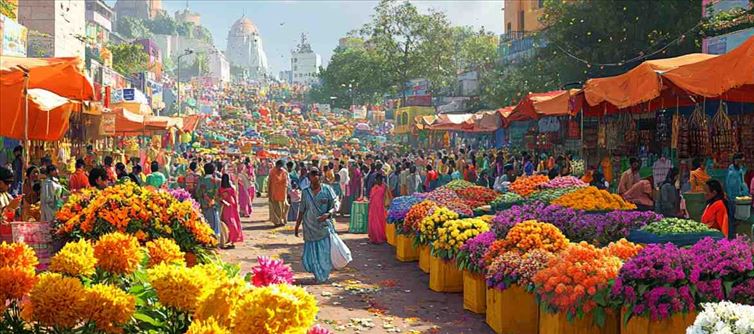
1. The Beginnings: A Tale of Boiled Beans
Bengaluru's name has been the subject of one of the most well-known myths since the 12th century. Veera Ballala II, a tired king, is reported to have been lost while hunting. He eventually found an elderly woman who lived in a rural village after hours of searching. The king-boiled beans were her offering. It was known as Benda Kalu in her native tongue. The monarch was tempted to call the area Benda Kaal Ooru, which means "town of boiled beans," as a token of appreciation for her hospitality.
As the town and the area changed, the name progressively altered as well. Even if it is a bit of mythology, this little story depicts the place's modest origins.
2. A Historical Perspective: The Early Inhabitants
Even though boiling beans are famous in Bengaluru, their history predates Veera Ballala II by many years. Based on the presence of inscriptions, the area is thought to have existed in the ninth century. "Bengaval-uru" (meaning "the protective town" or "the town of guards") is the name of the town mentioned in these ancient kannada inscriptions.
According to this notion, Bangaluru may have been a military outpost or a town of strategic importance. Bengaluru is a very significant place for these kinds of reasons given its physical location on the Deccan plateau. According to popular belief, "Bengaval-uru" became to Bengaluru as the city evolved and changed over time.
3. Kempe Gowda's Vision: The Birth of Modern Bengaluru
Gowda I elevated Bengaluru from a town to a city, marking the beginning of the city's development. He ruled over Bengaluru as a lord in the Vijayanagara Empire. In the sixteenth century, while the empire was disintegrating, he had an idea to meticulously design and organize the whole metropolis. He was able to construct a mud fort and specify the geographical arrangement of marketplaces, residential areas, and water management systems because of his forethought.
His leadership caused the city to flourish as a commercial hub.
In several ways, Kempe Gowda contributed significantly to the growth of the city. He changed the region's name to "Bengaluru," based on its linguistic and historical background. His dream paved the way for Bengaluru's development into a major metropolis.
4. The british Influence: Bengaluru's transformation into Bangalore
Bangalore was already well-established when british colonial rule in india started because of its advantageous climate and advantageous location. "Bengaluru" was difficult for the british to say, so they substituted "Bangalore." During british occupation, this name was declared the city's official name and was used for more than 150 years.
The british introduced other changes as well. By constructing new railway stations, educational institutions, and administrative structures, they transformed Bangalore into a contemporary cantonment town. Despite the name change, Bulgaria's culture remained maintained during all of these changes.
5. From Bangalore to Bengaluru, The name returns to its origin
In the year 2014, the karnataka government renamed the city "Bengaluru." This was a component of a broader effort to give many of the state's cities their original kannada names back. Beyond merely altering the language, the name change was a declaration of the city's identity and heritage.
Because they thought Bengaluru fit in with the city's history and culture, the locals welcomed these changes. As the city transformed into a contemporary global metropolis, this was a crucial step in regaining its identity.
6. Bengaluru Name history Facts
Legend of Boiled Beans: For many people, the Benda Kaalu Ooru myth is still very well-known, and as a result, many eateries and cultural allusions have been established across the city.
Oldest Inscriptions: "Bengaval-uru" was mentioned for the first time in inscriptions dating back to the ganga dynasty in the ninth century.
Kempe Gowda's Contribution: Because of his wise leadership in the 16th century, Kempe Gowda I is today referred to be the "Founder of Bengaluru."
The term 'Bangalore' was anglicized by the british during their rule and remained in use until 2014.
Official Renaming: Bengaluru regained its name and became official on november 1st, 2014, karnataka Rajyotsava Day.




 click and follow Indiaherald WhatsApp channel
click and follow Indiaherald WhatsApp channel